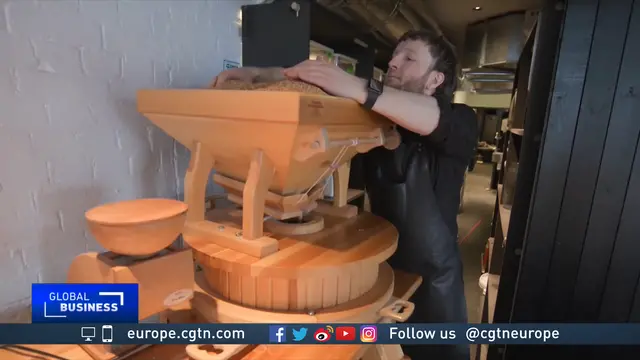04:03

The thatched Wheatsheaf Pub in the sleepy English village of Chilton Foliat, Wiltshire, dates back to the 19th century, but its sustainable approach makes it one of the most forward-thinking restaurants in the country.
Owner and chef, Ollie Hunter sources all produce for his classic pub menu locally in tune with the seasons – either grown in a Victorian walled garden at the family farm, or bought in from nearby suppliers. He bakes his popular pizzas in a wood-fired oven, using locally produced organic flour, makes his own crisps without packaging and serves draft organic beer. The menu is classic pub fare, but cooked and served with careful thought for every ingredient.
At first glance, the dining area of the Wheatsheaf looks like many traditional English village pubs, but every detail has been considered to conserve resources. The furniture is recycled, table salt is placed in seashells and seasonal flowers protrude from a used tin can.
Everything Hunter does is aimed at reducing waste and protecting the environment. 'It's about asking questions of yourself, about absolutely everything, he says. "The way you buy vegetables, the way you look at getting vegetables delivered to your door, the way you buy meat, the way you store meat, how you can make the most of the produce. [Also], the recycling, how many bins do you have, how many recycling companies do you have as a result, are you growing vegetables outside in your own garden, can you grow herbs too, to save on plastic waste?" he explains.
Hunter's efforts won him Britain's Most Sustainable Business Award in 2019. But he is still striving to improve. "The real aim is completely zero waste," he says, explaining that "zero waste means literally no packaging whatsoever. Everything comes from the farmer direct in something I can take back to them. Waste, you see it everywhere and so that is our real goal and our problem to solve – to get rid of all waste."
Three principles
Douglas McMaster is a pioneer of the zero-waste concept. He ran a restaurant in Brighton for five years, before moving his business to East London. His new restaurant, Silo, is in a trendy high-ceilinged loft space overlooking a canal. It has a sleek minimalist design, with everything from the sheep-wool insulation on the ceiling, to goat-leather aprons worn by the kitchen staff and an Austrian flour mill contributing to Doug's goals of protecting the environment.
He bases his business plan on three important principles. "Firstly, and most importantly is direct trade," he says. "So, by dealing directly with the origin of food, or of all the materials that we need, means that we can avoid the packaging. Secondly, it's whole food preparation. So, we make everything from scratch. We have to because that's the way it comes from nature. And then compost is the final pillar. We compost everything that we don't eat."
But Andrew Stephen, CEO of The Sustainable Restaurant Association, which encourages its members to operate with more consideration towards the environment, says zero waste is hard for most restaurants to achieve. "We think it's quite unlikely that a restaurant would ever get to genuinely zero waste, without quite a bit of inefficiency," he says. "For example, if a chef burns a leek, or if a customer doesn't finish everything on their plate. What that often means in the industry, is that it will be going to landfill, as opposed to being genuinely zero waste. But I guess it's important that restaurants don't get put off by the impossibility of zero. If everyone drove their waste in half, that's a tremendous benefit for the planet."
But sustainable restaurants are proving popular with the public, with people more aware of environmental concerns than ever before. It seems operating more sustainably could also be more profitable.
**Remember to sign up to **
Global Business Daily here
** to get our top headlines direct to your inbox every weekday**
 简体中文
简体中文





